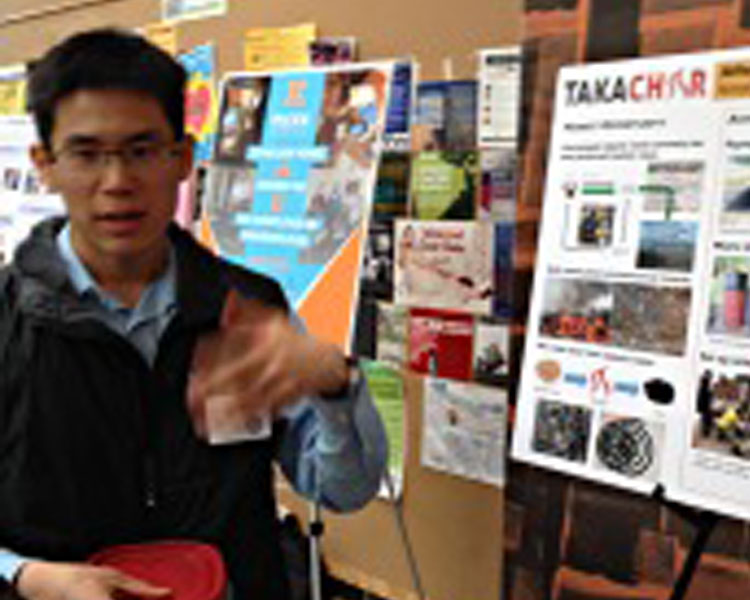
Sydney Beasley is a senior in the Civil and Environmental Engineering Department at MIT. During fall of 2013 she was an intern for the Comprehensive Initiative on Technology Evaluation, co-sponsored by D-Lab, and an intern for the Scaling Development Ventures Conference. For the conference, she was the lead student organizer and coordinated the production of this poster session.
The MIT Scaling Development Ventures Conference, held on Saturday, February 8 was an interactive experience for all attendees, including MIT students. Student social ventures and projects were highlighted through a poster session during the conference.
A call was put out to MIT students in November for applications to present new products and services intended for poverty alleviation in the developing world. By participating, students had the opportunity to network and receive feedback from international development practitioners and industry professionals and an opportunity win a $500 prize from the Public Service Center (PSC).
Thirteen students were selected to participate and present their ongoing projects. The conference showcased the work of students from multiple backgrounds and departments. Both undergraduate and graduate students were represented, including representatives from Engineers Without Borders, Global Poverty Initiative, Sloan, Legatum, IDEAS Global Challenge and PSC, as well as D-Lab. The participants are listed below:
- Comprehensive Waste Management through an Innovative Pilot Recycling Initiative in San Ignacio de Velasco, Bolivia: Keeley Erhardt, Sylvia Atsaves, and Shannen Kizilski
- SEA Change for Rice: Christopher Tang & Zech Lung
- Practical Education Network: Heather Beem
- Menstrual Hygiene in Rural Zambia: Elana Ben-Akiva, Miniver Chalwe, Anika Gupta, Martin Kasompe, Jessie Press-Williams, Inbar Yamin
- Embracing Education in Domasi, Malawi: J Narain, W. DeMaio, E. Mule, B. Reynolds, M. Singh
- No-Cost Charcoal Stoves in Rural Zambia (Kamphelo Village): Robert Shumaingo, Stephen Mvula, Jessie Press-Williams, Elana Ben-Akiva, Inbar Yamin, Anika Gupta
- Takachar: Affordable and Ecofriendly Products from Organic Waste: Samuel Rigu, Steve Kariithi, Kevin Kung
- Mbadika: Ideas and Those Who Create Them: Netia McCray
- ProtoPrint: World’s First 3D Printing with a Social Benefit: Sidhant Pai & Katie Spies
- Canematics: Changing the Way People Walk: Jiwon Park, Jennifer Tylock, Henry Kavle, Sang Jun Park
- PanDiagnostics – an Affordable Diabetes Diagnostic tool: Vivek Sivanthanu
- Love Grain: Ancient Grains. Modern Nutrition: Caroline P. Mauldin
- Aqua-Bridge: Tackling Drinking Water Crisis in Developing Countries: Peter Kang
Throughout the day, conference attendees were invited to review the posters and cast a ballot for the poster they felt deserved the $500 prize. The prize was designated for the student poster that demonstrated the best combination of a product or service innovation and potential for significant social impact. During the lunch period, students stood next to their posters to present their projects. There were a number of interactive presentations, including the Love Grain team, which demonstrated their product by cooking and giving out pancakes made from the Ethiopian grain Teff.
Before the closing remarks of the conference, the votes were cast and counted. The project with the most votes was ProtoPrint, presented by Legatum Fellow Sidhant Pai and Katie Spies, both seniors at MIT. ProtoPrint is 3d printing company that empowers urban waste pickers in India and produces the world's first socially beneficial 3D printer filament. Sidhant Pai remarked that he was grateful for the experience at the conference: “It was a great way to get exposure to other interesting projects and interact with the MIT development community. We really enjoyed ourselves.”
Ultimately, the poster session, organized by the Comprehensive Initiative on Technology Evaluation , PSC, and D-Lab helped demonstrate the depth of engagement and interest in international development in the MIT community. Both the students and conference attendees were appreciative of the chance to make connections and share experiences with each other.






